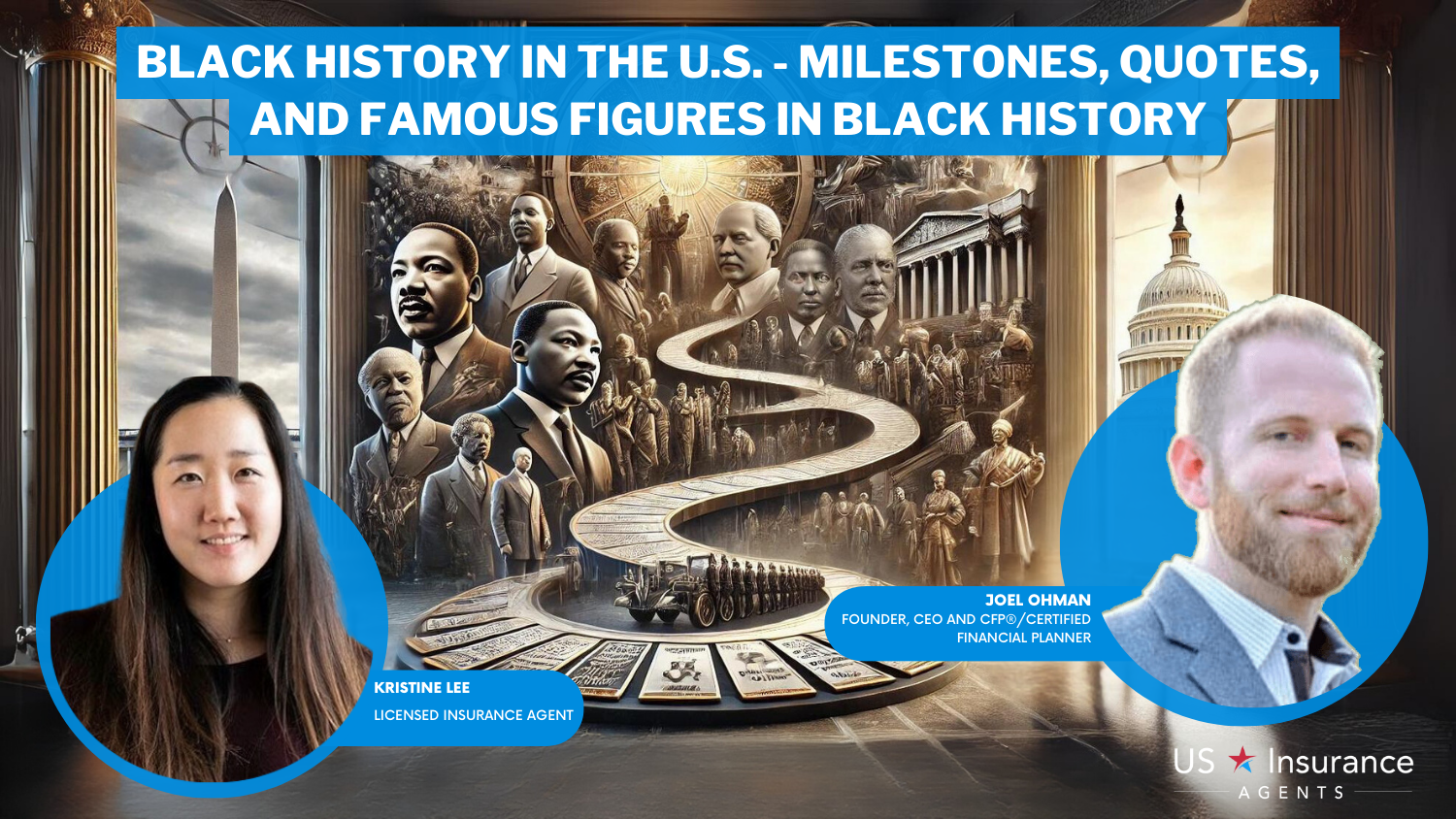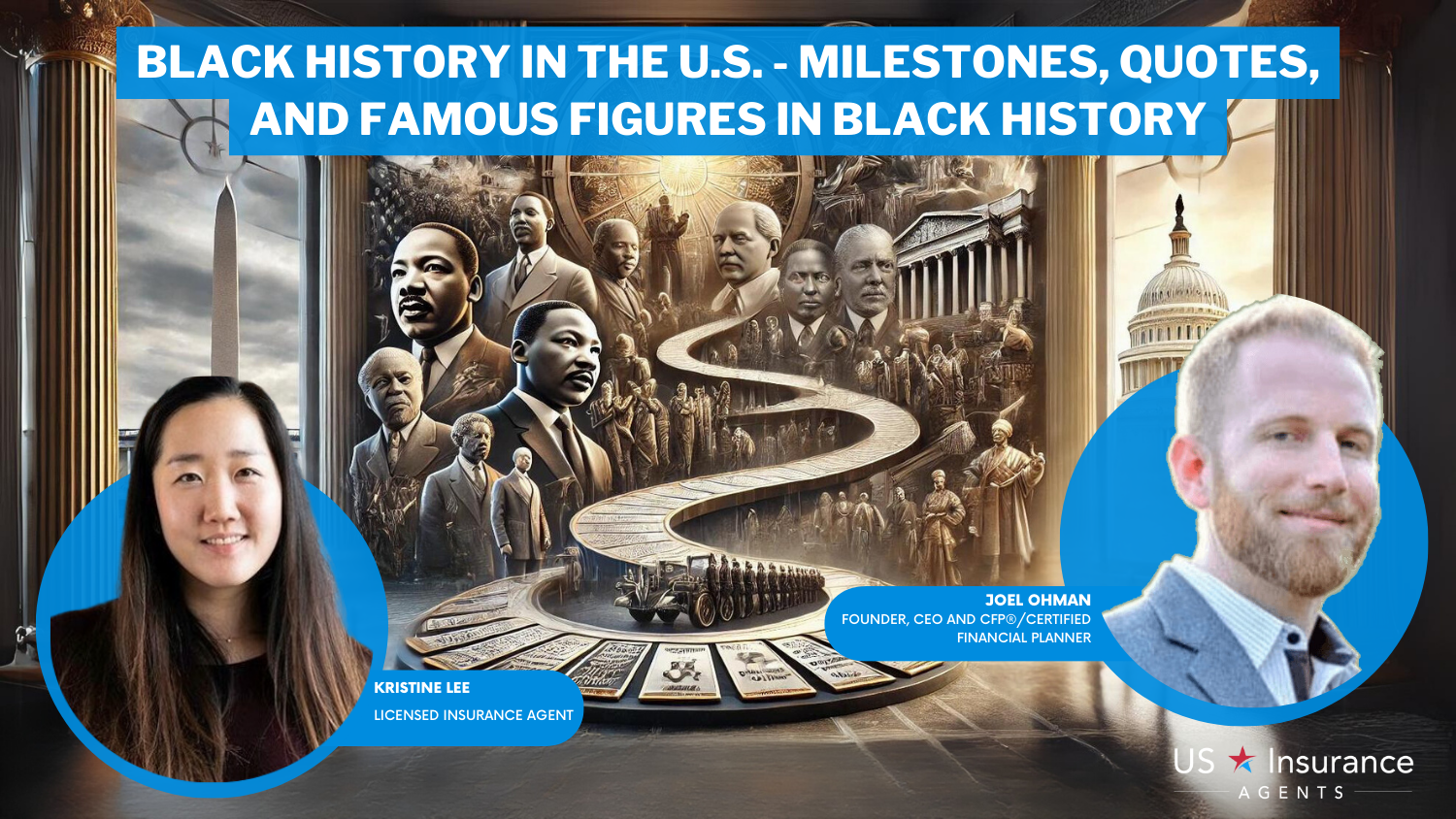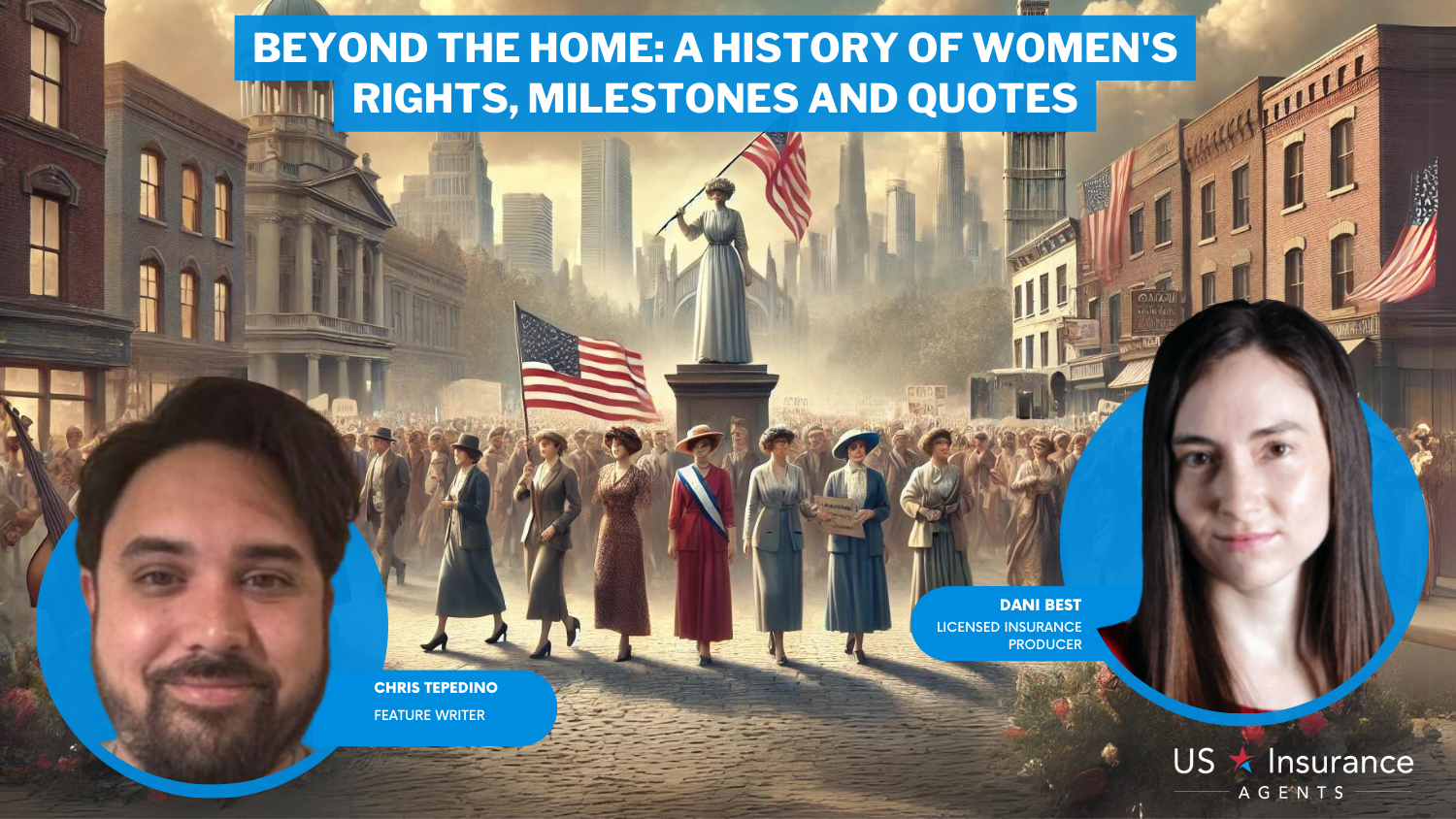Black History in the U.S. – Milestones, Quotes, and Famous Figures in Black History
Journey through the significant and inspiring legacy of Black history in the U.S. As we explore the pivotal milestones, powerful quotes, and influential figures that have shaped our nation. From the struggles and triumphs of the civil rights movement to the accomplishments and contributions of prominent Black leaders, artists, we delve into the richness and diversity of Black history.
Read more Secured with SHA-256 Encryption





Table of Contents
Table of Contents


Licensed Insurance Agent
Kristine Lee is a licensed insurance agent and one of The Zebra’s in-house content strategists. With a background in copywriting, she covers the ins and outs of the home and car insurance industries. She has been a contributor to numerous publications focused on the nuances of insurance, including on The Points Guy.
Kristine Lee


Sr. Director of Content
Sara Routhier, Senior Director of Content, has professional experience as an educator, SEO specialist, and content marketer. She has over 10 years of experience in the insurance industry. As a researcher, data nerd, writer, and editor, she strives to curate educational, enlightening articles that provide you with the must-know facts and best-kept secrets within the overwhelming world of insurance....
Sara Routhier


Executive Chairman
Joel Ohman is the CEO of a private equity-backed digital media company. He is a published author, angel investor, and serial entrepreneur who has a passion for creating new things, from books to businesses. He has previously served as the founder and resident CFP® of a national insurance agency, Real Time Health Quotes. He has an MBA from the University of South Florida. Joel has been mentione...
Joel Ohman
Updated October 2024
Welcome to our comprehensive guide on Black history in the U.S., covering the remarkable milestones, powerful quotes, and influential figures that have shaped the nation. From the civil rights movement to groundbreaking achievements in various fields, Black history is a testament to resilience, creativity, and the pursuit of justice.
In this article, we delve into the key topics surrounding Black history, exploring significant events, sharing inspiring quotes from notable figures, and highlighting the contributions of famous Black individuals. We celebrate the diversity and richness of Black history and encourage you to join us in this enlightening journey.
Ready to secure the right insurance coverage? Enter your zip code below and compare rates from the best insurance providers. Protect what matters most while honoring the legacy of Black history. Start now and make a difference
Milestones in U.S. Black History
The first Africans to arrive near Jamestown, Virginia in 1619 were nineteen indentured servants. Within a decade of their arrival, the slave trade into the country would officially begin.
In 1793, The Stono Rebellion, one of the most well-known early slave revolts, occurred in Stono, South Carolina.
In 1808, Congress prohibited the further importation of slaves.
In 1831, the Underground Railroad would begin, eventually guiding the way to freedom for approximately 75,000 slaves.
In 1846, an ex-slave, Frederick Douglass, published an anti-slavery newspaper called the North Star.
In 1849, Harriet Tubman escaped slavery and took on an essential role in the Underground Railroad.
In 1861, the Civil War started.
In 1863, Abraham Lincoln, a Republican president, proclaimed that all slaves would be free.
In that same year, the first regiment of African-American troops were led by Colonel Robert Gould Shaw into combat.
In 1870, the 15th Amendment was ratified, giving African-Americans the right to vote.
In 1881, the first Jim Crow segregation laws were passed.
In 1954, the Brown v. Board of Education case would result in the conclusion that segregation was unconstitutional.
In 1955, Rosa Parks was arrested for refusing to give up her seat on a bus. Her act would be one of the forces behind the Civil Rights Movement.
In 1963, Martin Luther King, Jr. gave his “I have a Dream” speech.
In 1964, the Civil Rights Act was signed, prohibiting discrimination.
It did not get through easily. While proposed by President John F. Kennedy, it met delays in the House and Senate. There was filibustering for fifty-four days. Eventually, the House voted on their version with 61% of Democrats and 80% of Republicans behind it. Similarly, when the Senate voted on their version, 69% of Democrats said “yea” while 82% of Republicans approved of the Civil Rights Act.
In 1967, Edward W. Brooke, running as a Republican, would become the first African-American U.S. Senator since Reconstruction. He went on to serve two terms.
In 2008 Barack Obama, a Democrat, would become the first African-American U.S. president.
Resources:
- National Public Radio: Black history month: Timeline of key dates in African-American history
- S. Forest Service: Timeline of events in African-American history
- Michigan State University: African American studies research guide: Milestones in black history
Free Auto Insurance Comparison
Compare Quotes From Top Companies and Save
Secured with SHA-256 Encryption
Famous Figures in U.S. Black History and Quotes
Rosa Parks, Martin Luther King Jr., Booker T. Washington, Thurgood Marshall, and President Obama have all left their mark on history, along with many other notable Black Americans who have made their way into the history books and American culture via politics, the civil rights movement, sports, entertainment, and every other aspect of American life.
“No, the only tired I was, was tired of giving in.”
-Rosa Parks
“Darkness cannot drive out darkness; only light can do that. Hate cannot drive out hate; only love can do that.”
– Martin Luther King Jr.
“In recognizing the humanity of our fellow beings, we pay ourselves the highest tribute.”
– Thurgood Marshall, first African-American U.S. Supreme Court member
“Success is to be measured not so much by the position that one has reached in life as by the obstacles which he has overcome while trying to succeed.”
– Booker T. Washington
“If you’re walking down the right path and you’re willing to keep walking, eventually you’ll make progress.”
– President Barack Obama
Resources:
- Xavier University: Black history month quotes
- University of North Carolina, Chapel Hill: Black power in American memory
- Washington State University: Famous quotes on nonviolence
American Black Culture
African-American culture started as a blend of Central African and Western cultures. It continued to flourish after emancipation and brought us music, art, fashion, dance, cuisine, and more. While it is both influencing and being influenced by mainstream American culture, black culture has also remained distinct.
The culture was first notably recognized in the 1920s and 1930s during the Harlem Renaissance. During that time, we were introduced to authors such as Nella Larsen, and poets such as Langston Hughes and Claude McKay. Jazz, swing, and blues became a part of popular music in the country. We also saw political involvement and the formation of the National Association for the Advancement of Colored People.
Resources:
- The American Prospect: Black culture and history matter
- University of California, Los Angeles: Redrawing the map of African-American culture and history in the United States
- National Museum of African-American History and Culture: A changing America: 1968 and beyond
Black History Landmarks and Historic Sites Across America
If you are planning a trip, consider adding some of these historical sites and landmarks to your itinerary:
The National Underground Railroad Freedom Center in Cincinnati Ohio commemorates the Underground Railroad and the network of houses and people involved.
The Birthplace of Martin Luther King Jr. in Atlanta, Georgia is part of a national historic site.
The Ebenezer Baptist Church in Atlanta, Georgia is where Martin Luther King Jr., his father, and his grandfather were pastors.
The Motown Historical Museum in Detroit, Michigan highlights the history of the well-known black-owned record label.
Malcolm X’s Birth Site in Omaha, Nebraska includes a plaza and memorial.
The Negro Leagues Baseball Museum in Kansas City, Missouri commemorates the first black professional baseball team, originally established in 1885.
The African American Civil War Memorial in Washington, D.C. commemorates the lives of soldiers who fought in the war.
To find more historical places to visit, go to the sites below:
- National Geographic: 12 destinations for African-American history and culture
- North Carolina State University: Beyond the beach: African-American history in coastal Carolina
- National Park Foundation: 6 powerful places to immerse yourself in African-American heritage
Free Auto Insurance Comparison
Compare Quotes From Top Companies and Save
Secured with SHA-256 Encryption
Books about Black History
Black history is so much more than just a single chapter in American history. Here are just a few of the many noteworthy books worth picking up:
The Souls of Black Folk was written by W.E.B DuBois in 1903 and discussed perspectives of black people at that time.
The Miseducation of the Negro, written by Carter G. Woodson in 1933, discussed problems in education and the struggle for education rather than indoctrination.
A Taste of Power by Elaine Brown was written from the perspective of a woman and Black Panther insider as the organization struggled with infiltration, police violence, and more.
To find more books, visit:
- Duke University: A Duke reading list of studies of race, politics, and history
- University of Kansas: Black History Month: A University of Kansas reading list
- University of Illinois: 13 essential books on black women’s history
Additional Resources
Would you still like to learn more? Check out Colorado State University’s list of books written by Black American authors that have been adapted to film. You can also visit African American History Month for online documentaries and videos. If you would like a more in-depth look, the Library of Congress keeps an online collection of literature.

Frequently Asked Questions
What is Black history in the U.S.?
Black history in the U.S. refers to the history of Black Americans, starting with their arrival in the country during the large Atlantic slave trade in 1619. It includes significant events, milestones, and contributions made by notable Black figures that have helped shape the country’s culture, history, and shared story.
How has black history impacted American culture and society?
Black history in the U.S. has had a profound impact on American culture and society. The contributions and achievements of Black Americans in various fields such as politics, sports, music, art, and science have significantly influenced the course of American history. Black Americans have also played a critical role in the struggle for civil rights, paving the way for greater equality and justice for all Americans.
What are some ways to celebrate Black History Month?
Black History Month, which is observed in February in the U.S., is an opportunity to celebrate and recognize the achievements and contributions of Black Americans. Some ways to celebrate include attending local events and cultural programs, reading books and watching films that highlight Black history and culture, volunteering for organizations that support the Black community, and sharing stories and knowledge about Black history with friends and family.
What are some common misconceptions about Black history?
One common misconception about Black history is that it is only about slavery and the Civil Rights Movement. While these are important parts of Black history, they do not represent the entirety of the Black American experience. Black history encompasses the full range of Black American achievements, contributions, and cultural heritage, and it is essential to recognize this diversity in order to fully appreciate the richness of Black history.
How has Black history impacted the insurance industry?
Black history has had an impact on the insurance industry in various ways. For instance, insurance companies played a significant role in the slave trade and the insuring of slaves as property. Black Americans have also faced significant challenges in accessing affordable and adequate insurance coverage due to systemic discrimination and racism. The insurance industry has made efforts to address these issues, including expanding access to coverage and increasing diversity and inclusion in the industry.
What is redlining, and how has it impacted Black Americans?
Redlining is a discriminatory practice that involves denying loans, insurance, and other financial services to people based on their race or the racial composition of their neighborhood. Black Americans have been disproportionately impacted by redlining, which has led to widespread economic and social disparities. Redlining has also contributed to the systemic underinvestment in Black communities, making it harder for Black Americans to access affordable housing, healthcare, and other essential services.
Get a FREE Quote in Minutes
Insurance rates change constantly — we help you stay ahead by making it easy to compare top options and save.









